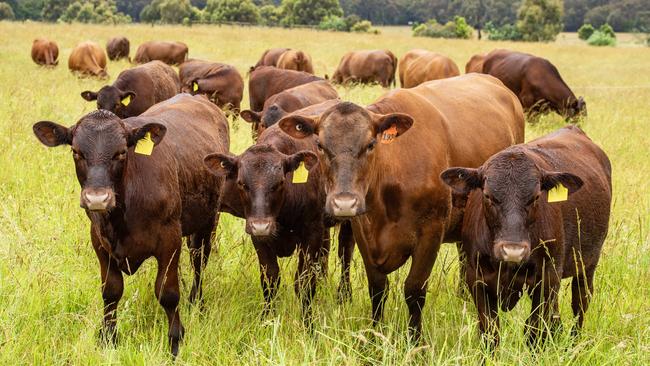A method behind $40m in carbon credits has been suspended
A method that generated the country’s fourth highest number of carbon credits, worth about $40m, has been suspended, leaving the beef industry fuming.

The federal government is already scrambling to find new or improved carbon credit methods for the beef sector after outrage from graziers over the sudden suspension of a highly lucrative method used by the industry’s biggest companies.
Industry leaders said the suspension last week of the Beef Cattle Herd Management method – responsible for generating about $40m in carbon credits – would undermine their ability to help the country meet its emissions reduction targets.
In response to the outcry, the government’s Emissions Reduction Assurance Committee arranged meetings with current and potential subscribers to the method to discuss “beef industry options and opportunities”.
The suspension of the scheme came a month after Nationals senator Susan McDonald raised concerns about delays in credits being issued to farmers by the Clean Energy Regulator.
The Beef Cattle Herd Management method has been around since 2015 and enabled graziers to earn Australian Carbon Credit Units for altering management practices that they could prove resulted in improved productivity and reduced emissions per tonne of meat produced.
Participants can then sell the ACCUs, with the current spot price at $42.50.
The government’s ERAC last week suspended the method until October 1, at which time it would automatically sunset.
It has left beef producers without any industry-specific carbon abatement method, despite the sector contributing about 10 per cent of Australia’s emissions.
Only 11 projects had been registered with the Clean Energy Regulator and three proponents – Consolidated Pastoral Company, Australian Agricultural Company and Paraway Pastoral Company – had been issued a combined 953,241 credits worth about $40m – the fourth highest amount of any registered scheme.
Existing projects, including the seven registered in 2022, will still be eligible for credits over their predetermined lifespan, but no new projects can be registered before the sunset date because of the suspension.
ACCU scheme methods automatically expire after 10 years but the ERAC assesses whether a project should be remade.
The early suspension of the Beef Cattle Herd Management method, 10 months ahead of its sunset date, caught the industry by surprise.
Industry group Cattle Australia labelled the suspension a “sneaky, shortsighted betrayal” of beef producers distracted by the Christmas period.
A Department of Climate Change, Energy, the Environment and Water spokeswoman said the ERAC’s review found “reasonable evidence that the method no longer complies with the offsets integrity standards”.
It comes after industry participants reported they had faced significant delays in being issued credits and raised concerns about the adequacy of the Department of Climate Change, Energy, the Environment and Water’s complicated spreadsheet-based calculator used to determine how much carbon had been abated.
Last month, CER acting chair and chief executive Carl Binning told a Senate estimates hearing that “the challenges the industry has faced with the calculator have been significant and caused extensive delays, and we would acknowledge those delays and the impacts”.
Mr Binning could not say how many pastoralists had been affected by the delay, first reported in “late 2023 or early 2024”.
“It really comes to the ability to develop and have ACCUs issued,” Mr Binning said. “That means that they can’t then realise the value of those ACCUs.
“Stakeholders have also raised, on a number of occasions, concerns with us around their end-of-financial-year reporting.”
He said he was “satisfied with the calculator” and its ability to provide an accurate assessment, but issues were being worked-through with proponents.
“The calculator is not a simple tool, it’s a complex tool, so there still remain a number of issues related to its usability,” he said.
“And we are working very closely with the impacted project proponents to ensure we can work through those issues in as timely a manner as possible.”





To join the conversation, please log in. Don't have an account? Register
Join the conversation, you are commenting as Logout